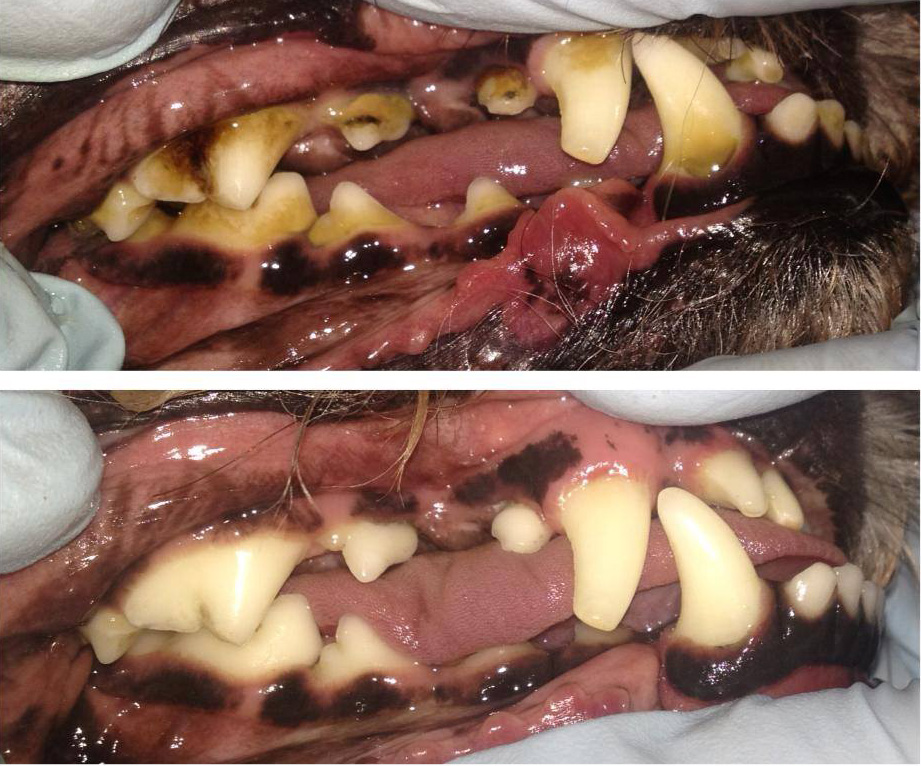Here are answers to some of the questions we get asked most often! If you do not find what you’re looking for here, please do not hesitate to contact us.
Anesthesia-Free Teeth Cleaning *currently unavailable
Why should I have my dog’s teeth cleaned?
According to the American Veterinary Dental Society, 80% of dogs and 70% of cats show signs of periodontal disease by age 3. Without proper dental care for a pet they can develop gingivitis, which is plaque build-up on a dog’s teeth and gums that may appear red and swollen. The problem begins when plaque and tartar are allowed to build up on a pet’s teeth. Plaque harbors the bacteria, which can infect gum tissue and the roots of teeth resulting in disease and tooth loss. Besides the negative impact on the oral health, bacteria can enter the bloodstream through the large blood vessels located near the gums and teeth. At this stage, the organs with the highest blood flow are the most susceptible to infections: lungs, heart, kidneys, liver and even the brain. Damage to these organs caused by infection can shorten the lives of our pets.
Performing regular teeth cleanings on your pet removes the plaque and tartar buildup on the inside and outside surfaces of the teeth, preventing or slowing gum disease, and improving your pets overall health.
What’s the difference between what you do and having their teeth cleaned at the vet?
At Happy Pooch we clean your dog’s teeth without any anesthesia, while veterinarians will typically sedate your dog, carrying with it multiple risks. In a study performed by the American Animal Hospital Association, it was found that 1/233 dogs will die from anesthesia, and 1/9 will have complications. Please be advised that some pets will require anesthesia for teeth cleaning due to advanced periodontal problems requiring extractions and a deep cleaning of periodontal pockets.
How the heck do you do it?
This is definitely our most frequently asked question! Most of our clients come in being uncertain about whether their dog will cooperate and we can tell you from experience that we are able to successfully calm and clean more than 99% of the time! Check out our FAQ video to see how we hold dogs.
Your pet lies on the floor on a soft surface with their head in our lap. With small dogs, we may wrap them in a towel to make them feel more secure. We hand-scale their teeth with dental instruments, just like when you go to your dental hygienist. The teeth are cleaned inside and out, removing the tartar build up. When we are done scaling, we polish the teeth. You receive a report telling you what we were able to see during their appointment.
Is it as effective as having teeth cleaned by a vet?
Anesthesia-free teeth cleaning is appropriate for routine cleanings, but if your dog has advanced periodontal disease, deep pockets or needs extractions you may need to go to the vet. When we first look in your pets mouth if we immediately find problems that appear to need your veterinarians attention, for example a molar that appears loose, we will refer you back to your vet to have a dental cleaning under anesthesia and there will be no charge. If during the appointment we find any problems, we will communicate this to you so you can discuss any further action with your own veterinarian. In most cases we are able to perform a thorough cleaning, however.

You can also check out some more before and after photos in our gallery.
How much does it cost?
Starts at $200+GST for all dogs.
How long does it take?
In only takes 60 – 90 minutes. And the best part – no recuperation time!
Are there any risks associated with anesthesia-free teeth cleaning?
When a dog has advanced periodontal disease with many loose teeth, it may not be possible to remove all the tartar and clean the teeth that are loose. Even in dogs with mild to moderate gingivitis, however, the process is quite straightforward and the inflammation of the gums from the bacteria associated with the tartar will reduce following the procedure.
What ages are appropriate?
No age minimum or maximum. It’s never too early with good oral hygiene. Some gum disease can be irreversible and as dogs age teeth can become looser, bones can become brittle and the ability to do a thorough cleaning may be reduced. I will discuss this with you prior to the teeth cleaning – going anesthesia-free still may be your best option for teeth cleaning.
Will you be medicating my dog in any way?
We will not give your dog any calming agent. We rely on communication and soothing touch to calm your dog.
What if my dog is really large, hyperactive and / or anxious?
Please discuss this with us. Large dogs are no problem (though there is a surcharge as we sometimes require an assistant), however we reserve the right to refuse to perform the procedure if the dog is too anxious or aggressive.
